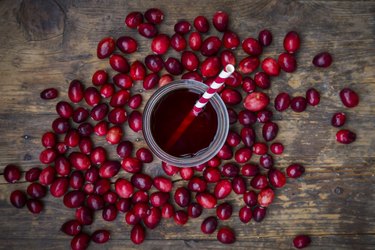
Drinking cranberry juice is often used to treat urinary tract infections — its function is to serve as a UTI treatment without antibiotics — although whether it's actually effective has not been medically proven. Cranberry juice has other health benefits, such as being high in vitamins and minerals.
Tip
While cranberry juice is often consumed to treat or alleviate the symptoms of a urinary tract infection (UTI), it has not been medically proven that drinking cranberry juice can heal the infection.
Video of the Day
Cranberry Benefits
Cranberry, a native evergreen shrub, grows throughout North America and produces tart red berries that are a staple on the Thanksgiving table in the form of sauce. Cranberry juice is widely available in stores and it is usually sweetened with added sugar or another fruit juice such as apple or grape.
Video of the Day
You may also buy cranberry juice without sugar. Pure, or unsweetened, cranberry juice is often used as a dietary supplement to treat or prevent urinary tract infections, according to the National Center for Complementary and Integrative Health. Cranberries and the leaves from the cranberry plant have been used in traditional medicine to treat bladder, stomach and liver disorders, wounds and diabetes.
Cranberries have other beneficial attributes. A study published in the May 2016 issue of the magazine AgResearch showed that drinking two 8-ounce glasses of cranberry juice a day lowered several risk factors for cardiovascular disease (CVD), diabetes and stroke.
Pure cranberry juice is distinguished from other commercially produced juices by the lack of any added sugar. It is also nutritionally beneficial. According to the USDA, unsweetened cranberry juice contains the minerals calcium, magnesium, potassium, selenium, iron and zinc and is a good source of 15 essential vitamins including vitamins C, B6, B12, E, K and A as well as thiamine, niacin and riboflavin.
A one-cup serving of unsweetened cranberry juice contains 116 calories, almost a gram of protein and 30 grams of carbohydrates, as per the USDA. Although it is unsweetened, pure cranberry juice contains 30 grams of naturally occurring sugar. Cranberry supplements are also available in the form of cranberry pills, extracts, powder and capsules.
Read more: The Daily Dose of Cranberry Pills
Cranberry Juice For UTIs
There is no real scientific cranberry juice UTI evidence although it is often used for a UTI treatment without antibiotics (other home remedy treatments can include garlic for UTI or baking soda for UTI).
An article published by the Cleveland Clinic argues that drinking cranberry juice or taking cranberry supplements to cure a UTI probably doesn't help. Cranberries contain an active ingredient, A-type proanthocyanidins (PACs) — this can help prevent adherence of bacteria to the bladder wall. But the article cites urologist Courtenay Moore, MD, who says there is not enough of this active ingredient in juice or supplements to prevent or heal UTIs.
The University of Wisconsin School of Medicine and Public Health also states that there is no evidence that cranberry can cure a UTI. But if you wish to try it, the school recommends drinking pure cranberry juice rather than one with added sugar. It mentions that drinking a cranberry juice blend will have no more effect on the UTI than drinking another type of fruit juice.
A Harvard University Health Letter reports that the evidence about whether cranberry juice helps prevent UTIs is mixed, noting that many commercially available cranberry juices may be high in added sugar and calories.
Drinking pure cranberry juice is generally considered to be safe, the NCCIH shows, although drinking it in large amounts could cause an upset stomach and may over time increase the risk of kidney stones. Large doses of cranberry may alter levels of warfarin, an anticoagulant (blood-thinner).
If you have a urinary tract infection it's best to consult with your doctor regarding treatment, although drinking cranberry juice can give you some additional nutritional benefits.
Read more: Should You Avoid Certain Foods With a UTI?
- USDA: "Cranberry Juice, Unsweetened"
- National Center for Complementary and Integrative Health: "Cranberry"
- University of Washington: "Cranberry Juice and Urinary Tract Infections"
- Cleveland Clinic: "Can Cranberry Juice Stop Your UTI?"
- Harvard University Health Letter: "New Thinking About Urinary Tract Infections"
- Ag Research: "Cranberry Juice Can Boost Heart Health"